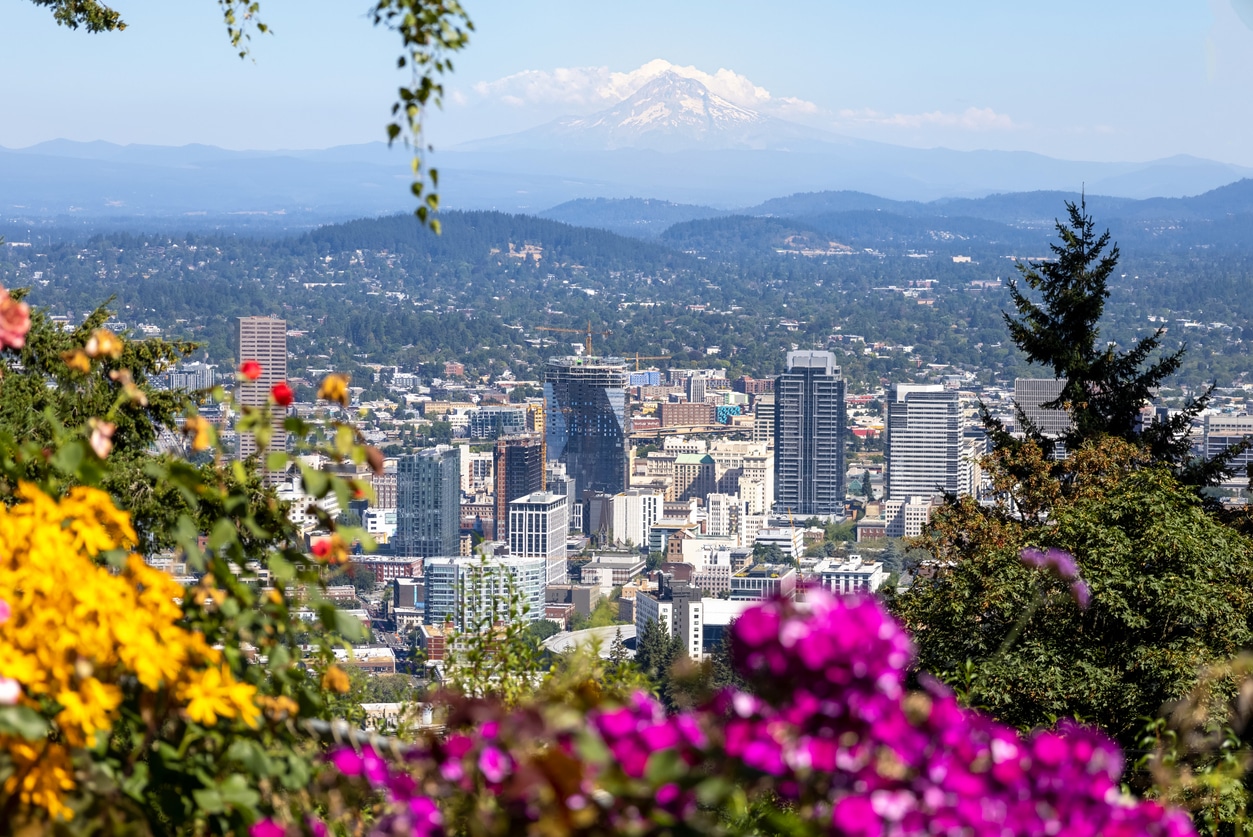Airbnb vs. Portland Real Estate Market – Good or Bad?

Updated 09/23.
Airbnb, a multi-billion dollar startup company that allows homeowners to enter the hospitality business, is transforming the Portland housing market. What is its true impact on renters, homeowners, buyers, sellers, and real estate investors, and what will the city do about it? New York recently banned Airbnb due to housing market concerns, will Portland, Oregon be next?
Airbnb has a Huge Presence in Portland, Oregon
In case you weren’t already familiar, Airbnb is a service that allows individual homeowners to list their spare room or the entire house as a short-term rental. Its corporate headquarters are in Portland, and over 4,700 Airbnb listings are offered here, worldwide it has more than 7 million listings in over 220 countries as of 2022. Although 15+ different sites allow Portland homeowners to list short-term rentals, the vast majority are using Airbnb.
How New York Cracked Down on Airbnb
Airbnbs have had a tempestuous history in New York city. From raising rent prices to less-than-stellar Airbnb listings that suck guests in closets, Airbnb has had a messy history with New York. However, as of September 12, 2023, Airbnb may be all but finished in New York. Local Law 18, which passed in January of 2022, makes listing a private residence like a home or apartment nearly impossible, limiting the number of Airbnb hosts in the city.
This new rule tossed a wrench in the standard Airbnb operating system. By not allowing home rentals unless a home is approved and a host is present during the rental, the effective number of Airbnbs in New York started to drop rapidly. As soon as the law went into effect the number of rentals went from over 22,000 to only 7,000, with that number likely to fall.
How this drastic law will impact rental services like Airbnb and VRBO has yet to be seen, but it’s likely to cut down on the number of illegal rentals and stop a lot of the speculative Airbnb real estate. In fact, many Airbnb owners have sold their properties in light of this new law, and more may follow. Some have also converted their listings to 30-day rentals, which have less restrictions. While the hope is that more apartment landlords will list their properties as rentals and not Airbnbs, the impact this will have on the rental market has yet to be seen.
How Portland Handles Short-Term Rentals
Not every country and city has embraced the concept of turning homes and apartments into de-facto hotel rooms. In fact, in 2014, Portland became the first city to strike a deal with Airbnb, exchanging permission to operate for some basic rules intended to avoid some of the issues that Airbnb has had in other places. These “terms and conditions” apply to Airbnb listings and those placed on similar sites such as Vacasa, VRBO and HomeAway.
So, What Are the Restrictions on Short-Term Rentals in Portland?
Portland requires that homeowners offering rooms or units as short-term rentals acquire a permit to do so, and they can only act as “hosts” if they are living in the primary dwelling on the property (which means they must stay there for at least nine months out of the year). Guests, meanwhile, can rent the room or unit for a maximum of 30 days under Portland’s rules. Every Airbnb stay comes with an 11.5% lodging tax. See the City of Portland’s Short-Term Rental Guidelines here.
The rules are cut-and-dried, but unfortunately, compliance is not. From February 2017 to August 2018, Portland issued 186 citations to property owners for operating without the city-required permit, according to a story on Oregon Live. A 2018 city audit found that 80% of Portland Airbnb listings operate without a permit.
How Airbnb Impacts Rent Prices
Many people in larger cities complain that Airbnb leads to raising rent prices, and they may not be off the money. One study found that when Airbnb moves into a city, the rent starts to increase. While this is just one study in the Boston Area, it does point to an interesting trend, namely landlords moving from lease-based rentals to Airbnb listings.
Why the switch to short-term listings? This comes from a variety of factors. First, landlords no longer need to find someone to sign a lease, either in the form of a month-by-month agreement or a yearly lease. Instead, they can rent their property for a fraction of the time and make significantly more money.
While Airbnb earnings vary depending on the area, a 15-day host in the Portland area can look at earning more than $2,000, which exceeds the average rent of around $1,700 for a traditional rental. That means if they have two 15-day listings back-to-back, they can double their profits on a single listing.
However, with more landlords switching to Airbnbs, there are less overall apartments available, meaning scarcity can drive up the rent. That’s where the call for Airbnb and restrictions comes into play. By restricting the kind of Airbnb rentals, cities like Portland and now New York hope to drive down their rent, and potentially manage their housing market prices. Whether these restrictions will have this kind of positive impact on the rental market has yet to be seen, however.
Short-Term Rentals: How Do They Impact Portland Housing?
Experts generally agree that short-term rentals cut into the available housing stock of people who actually want to live in a city. However, the degree to which this is happening is unclear. If an entire home or accessory dwelling unit is available for rent through Airbnb for most of the year, it could be considered a potential long-term rental that full-time residents are losing access to. According to an industry watchdog, the number of homes currently meeting this criteria on Airbnb is 3,940. That’s over 80% of the current available listings.
For perspective, consider that a large apartment building in Portland has only around 300 units (with 30-unit structures being much more typical). Although Portland is building new apartments all the time—4,200 units in development in 2022—it’s not enough to keep up with demand. Since 2015, the city has been in a continued Housing Emergency as declared by the mayor’s office.
It’s hard to predict homeowner behavior, but Portland has the legal option—if not the human power—to enforce its own rules. If the permit system were fully enforced, some illegal short-term rentals would shut down and other homes might turn into actual long-term rental units instead of Airbnb rentals. If all potential units hit the Portland rental market right now, it would certainly drive have a downward effect on rents.
According to the Oregon Live report, Portland doesn’t have enough data to determine how Airbnb activity affects renters. It is currently negotiating with the corporation to obtain this data and take action on illegal rentals.
The “Airbnb Effect” on Portland Property Values
Legal short-term rentals still have an important role to play in Portland. Homeowners can offset part of their mortgage payment by renting out a room or an apartment—or even their whole home if it’s for less than three months—on a site like Airbnb. For instance, renting a single room for 15 days out of the month in Portland could earn a homeowner $2,535/month, according to Airbnb. Of course, that’s taxable income, and homeowners should also consider the time they spend cleaning the room and communicating with potential guests when tallying their actual profits.
Certain neighborhoods of Portland have become short-term rental hotspots, most of which are in Southeast and Northeast Portland. Although neighborhoods experiencing high short-term rental saturation are said to have become “hotelized,” with plenty of hand-wringing about the impacts, the issue has not been extensively studied. However, one study in Los Angeles County in 2018 found a 10-14% increase in home prices in areas near tourist attractions heavily saturated with Airbnb properties.
As a real estate agent, I find that local neighborhood dynamics are the biggest driver of home values. Real estate agents estimate listing prices for homes based on what other homes in the neighborhood are selling for. If a short-term rental is helping a homeowner meet their mortgage payment and preventing the house from being foreclosed on, then it has a definite positive impact on neighborhood home values. If there are several short-term rentals being poorly managed in a neighborhood, and buyers are making lower offers as a result, this could eventually drag down home values.
Airbnb Requirements and Restrictions
Let’s take a look at the requirements from Airbnb for their hosts. While Airbnb allows rentals of all types, from tiny homes and single spare rooms to whole home rentals and even camps, they do have specific guidelines and instructions about how hosts run their rentals.
These restrictions and regulations fall into five categories:
- Consistency
- Commitment
- Communication
- Accuracy
- Cleanliness
Assuming Airbnb’s requirements and restrictions are met, it seems less likely that home values would drop in a given area, though one can find many news articles where those same requirements and restrictions were broken and the local neighborhood’s quality of life was affected.
Condo Owners Take Caution
Listing a room in a condo as a short-term rental might be in violation of HOA rules. In addition, the Federal Housing Administration (FHA) may not approve loans for condos with short-term rental anywhere in the building, according to the Washington Post. That means homebuyers approved to finance their condo purchase could have their application rejected for a single Airbnb listing, even if it’s going on in another unit.
Are ADUs the Solution for Portland?
Portland is currently in the process of voting on new infill rules that would allow more Accessory Dwelling Units (ADU) to be built across Portland. An ADU, which is basically a detached or attached apartment built on the same property as a single-family home, can be used as either a short-term or long-term rental. A 2018 Portland State University survey found that about one-fourth of Portland ADUs are used as short-term rentals. And prior research by the Sustainability Institute at PSU found that only about 2.5% of properties identified as “prime” locations for ADUs currently have ADUs on them. If all were built out, it would this translates to nearly 71,000 new housing units.
Check out our blog posts on whether your piece of Portland real estate is right for an ADU and some options for designing and funding an ADU project.
Talk with a Property Advisor
Are you deciding what to do with a home or investment property? Our top 1% sellers agents can provide you with a local market forecast and accurate home value. Our top 1% buyers agents can help you find your next dream home or new real estate investment opportunity. Give us a call today at 503-714-1111 or chat with this bot on this site. We’d love to connect!


